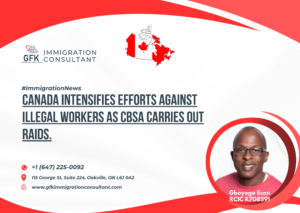Powered by  Translate
Translate
In recent weeks, it has been reported that the Canada Border Services Agency (CBSA) has ramped up enforcement, conducting raids and spot checks to identify individuals working illegally in the country.
This sudden surge in activity, aimed at ensuring compliance with the Immigration and Refugee Protection Act (IRPA) and reports are coming from various provinces, including Alberta, British Columbia, and Nova Scotia.
Working illegally in Canada has long been a trend due to the leniency of CBSA, unlike countries that liked the United Kingdom being more proactive on such issues, but it seems like CBSA has now rolled up their sleeves to weed out the illegals.
This article provides a detailed look into these enforcement actions, their legal consequences, and what individuals working without authorization can do to avoid removal orders or deportation.
Canada intensifies efforts against illegal workers
CBSA Spot Checks and Raids: What’s Happening?
The CBSA has intensified its efforts based on tips and intelligence to track down individuals engaged in unauthorized employment.
Most talked about being two categorical incidents that are being reported across the web:
- Construction Workers Caught in Alberta: According to Raj Sharma, a prominent immigration lawyer, a van carrying construction workers was intercepted during a spot check.
- The workers, identified by their paint-stained hands and uniforms, were found to be employed illegally.
- Truck Drivers Working Without Permits: Another alarming trend involves international visitors obtaining truck driving licenses and working illegally while on visitor visas.
- CBSA has reported multiple cases of truck drivers caught during enforcement checks, leading to removal orders.
These actions reflect a significant shift in Canada’s immigration enforcement.
Traditionally, Canada was perceived as lenient regarding temporary visa violations.
However, this wave of crackdowns indicates a new era of much-needed strict enforcement.
The Legal Risks of Working Illegally in Canada
Engaging in unauthorized work in Canada can lead to severe legal consequences.
Understanding these risks is critical for anyone currently working without the proper permits. Here are the key penalties:
- Section 44 Report and Removal Orders: When CBSA officers identify individuals working without authorization, they may issue a Section 44 report, which can lead to a removal order.
- Removal Order: Individuals must leave Canada within 30 days. Failure to comply can escalate the removal order to a deportation order.
- Exclusion Order: In some cases, individuals may receive a 12-month exclusion order, preventing re-entry into Canada for one year.
- Deportation and Permanent Bans: A deportation order is the most severe consequence, permanently banning individuals from returning to Canada unless they obtain special authorization.
- No Refugee Claims After Removal Orders: Some individuals, upon receiving removal orders, attempt to file refugee claims.
- However, under Canadian law, once a removal order is issued, a refugee claim is not permitted.
- This can further complicate their immigration history and affect future visa applications.
Temporary Residents and Overstays: The Scope of the Problem:
Canada intensifies efforts against illegal workers
Canada has seen a sharp rise in temporary visa holders overstaying their permitted stay, contributing to the increase in illegal employment.
The government estimates that between 500,000 and 1 million undocumented workers are currently in Canada. These individuals include:
- International students working beyond authorized limits
- Temporary foreign workers staying beyond their visa expiration
- Visitor visa holders engaged in unauthorized employment
The recent raids are anticipated to be contributing towards Immigration Minister Mark Miller’s broader strategy to reduce the number of temporary residents in Canada by 20%.
This initiative reflects a significant policy shift aimed at balancing immigration levels.
What Can You Do if You Are Working Illegally?
If you find yourself on the wrong side of Canadian immigration law, here are some steps you can take:
- Consult an immigration lawyer: An experienced immigration lawyer can help assess your options and guide you through the process of regularizing your status. This may include applying for extensions, restoration, or alternative immigration pathways.
- Understand Implied or Maintained Status: If you have applied for an extension of your permit while your current permit is still valid, you are legally allowed to stay and work under your previous permit conditions until a decision is made.
- Get a departure certificate if ordered to leave: If you receive a removal or exclusion order, ensure you obtain a departure certificate from CBSA.
- This certificate confirms that you complied with the removal order. Without it, the removal order could escalate to a deportation order.
- Avoid Filing Refugee Claims Without Grounds: Filing a refugee claim without valid grounds can jeopardize your immigration status and complicate future applications to Canada or other countries.
The Path Forward: Legal Alternatives to Unauthorized Work or Stay
Rather than risking removal or deportation, individuals facing challenges in Canada can consider alternative strategies:
- Return to Home Country and Build Credentials: Returning to your home country to pursue additional education or gain relevant work experience can increase your eligibility for Canadian immigration programs.
- Learn French: French language skills can boost your Express Entry points and open pathways through Francophone immigration programs.
- Gain Priority Work Experience: Focus on sectors such as healthcare, trades, agriculture, or STEM to enhance your eligibility for future immigration draws.
- Explore Restoration of Status: If you have overstayed your visa or permit, restoration applications are an option but must be filed within 90 days of your status expiring.
- Stay updated on Immigration Policy Changes: Canada’s immigration policies are evolving rapidly. Staying informed about changes can help you make proactive decisions.
Compliance Is Key to Staying in Canada
Canada offers numerous pathways to permanent residency and long-term immigration, but working illegally is not one of them.
The recent CBSA raids serve as a stark reminder that unauthorized employment can lead to severe consequences, including removal and deportation.
With the federal government tightening immigration policies and enforcing rules more rigorously, now is the time to ensure compliance with immigration laws.
If you are currently in Canada and concerned about your status, it is essential to act immediately.
Seek legal advice, explore restoration options, or consider returning to your home country to strengthen your future immigration prospects.
Staying on the right side of the law is the only way to build a secure future in Canada.
By following the legal routes and avoiding unauthorized work, individuals can position themselves for success under Canada’s immigration system.
The risk of removal is real, but so are the opportunities—if pursued correctly and legally.
Canada intensifies efforts against illegal workers

GFK Immigration
Gboyega Esan RCIC R708591
Phone: +1 (647) 225-0092
#StudyPermit #CanadaImmigration #PostGraduateOpportunities #GFKImmigration #StayInCanada #Express #ExpressEntry #draws #Immigration
#HappyThanksgiving #ThankfulInCanada #GFKImmigration

